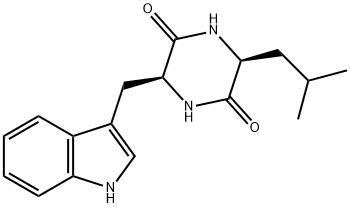Cyclo(L-Leu-L-Trp) is a diketopiperazine metabolite originally isolated from
Penicillium.
1 It is active against various bacteria (MICs = 125-1000 μg/ml) and fungi (MICs = 8-64 μg/ml), and it inhibits the production rate of hydroxy radicals in an electron spin resonance (ESR) spectroscopy-based assay (IC
50 = 1.8 μM).
2,3 Cyclo(L-Leu-L-Trp) is a bitter tastant that can rapidly permeate rat taste cell membranes
ex vivo when used at a concentration of 1 mM.
4 It also acts as a melatonin receptor agonist in
X. laevis melanophores, inhibiting cAMP accumulation when used at a concentration of 20 μM, an effect that is blocked by the melatonin receptor antagonist luzindole .
5
1. Solov'eva, T.F., Baskunov, B.P., Nefedova, M.Y., et al. Biosynthesis of leucyl-tryptophanyl-diketopiperazine by a culture of Penicillium aurantio-virens and the characteristics of its production Mikrobiol. 58(3),393-399(1989).
2. Kumar, S.N., Mohandas, C., and Nambisan, B. Purification, structural elucidation and bioactivity of tryptophan containing diketopiperazines, from Comamonas testosteroni associated with a rhabditid entomopathogenic nematode against major human-pathogenic bacteria Peptides 53(2014),48-58(2014).
3. Furukawa, T., Akutagawa, T., Funatani, H., et al. Cyclic dipeptides exhibit potency for scavenging radicals Bioorg. Med. Chem. 20(6),2002-2009(2012).
4. Naim, M., Nir, S., Spielman, A.I., et al. Hypothesis of receptor-dependent and receptor-independent mechanisms for bitter and sweet taste transduction: Implications for slow taste onset and lingering aftertaste Chemistry of Taste 825,2–17(2002).
5. Zubare-Samuelov, M., Peri, I., Tal, M., et al. Some sweet and bitter tastants stimulate inhibitory pathway of adenylyl cyclase via melatonin and α2-adrenergic receptors in Xenopus laevis melanophores Am. J. Physiol. Cell Physiol. 285(5),C1255-1262(2003).
